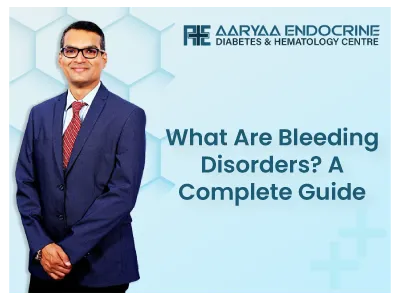
Bleeding disorders are medical conditions that affect the way your blood normally clots. When you get injured and start bleeding, your body activates a process involving platelets and clotting factors to stop the bleeding. In people with bleeding disorders, this process doesn't work properly, leading to prolonged or excessive bleeding. These disorders can be inherited or acquired and require proper diagnosis and management.
Bleeding disorders can vary in severity and may impact people differently based on the type of disorder they have. Understanding the symptoms, causes, and treatment options is essential for early diagnosis and effective care.
What Are Bleeding Disorders?
Bleeding disorders occur when there is a problem with the blood clotting system in the body. Normally, clotting factors and platelets work together to form a plug at the site of a blood vessel injury. In people with these disorders, the process is either slowed or incomplete, leading to spontaneous or prolonged bleeding.
The most common bleeding disorders include Hemophilia A, Hemophilia B, and von Willebrand Disease. Other rare forms exist and may also be linked with other health conditions.
Causes of Bleeding Disorders
Bleeding disorders may be caused by several factors:
- Genetic mutations that affect clotting factor production.
- Liver disease, which can impair the production of clotting proteins.
- Vitamin K deficiency, which is essential for producing certain clotting factors.
- Side effects of medications, such as anticoagulants or chemotherapy drugs.
- Autoimmune conditions that destroy platelets or clotting proteins.
Common Symptoms of Bleeding Disorders
Recognizing symptoms early can help in effective treatment. Symptoms may include:
- Frequent nosebleeds.
- Easy bruising.
- Prolonged bleeding from cuts.
- Heavy menstrual bleeding.
- Blood in urine or stool.
- Joint pain or swelling (especially in hemophilia).
- Spontaneous bleeding without known injury.
If any of these symptoms occur persistently, medical advice should be sought promptly.
Diagnosis of Bleeding Disorders
Diagnosis typically involves a series of blood tests to determine clotting function. These may include:
- Complete Blood Count (CBC): To measure platelets.
- Prothrombin Time (PT) and Activated Partial Thromboplastin Time (aPTT): To evaluate clotting factor activity.
- Factor Assays: To identify specific clotting factor deficiencies.
- Von Willebrand Factor Antigen Test: Specifically used to diagnose von Willebrand disease.
A proper diagnosis helps doctors customize a treatment plan that best suits the patient’s condition.
Treatment Options for Bleeding Disorders
Treatment depends on the type and severity of the disorder. Options include:
- Replacement therapy: Infusion of clotting factors to compensate for deficiencies.
- Desmopressin (DDAVP): Used to treat mild hemophilia A and von Willebrand disease.
- Antifibrinolytic medications: Help prevent blood clots from breaking down.
- Hormonal therapy: May help manage heavy menstrual bleeding.
- Platelet transfusions: For severe platelet disorders.
People with bleeding disorders should avoid contact sports and certain medications like aspirin that could worsen bleeding.
Living with a Bleeding Disorder
Managing a bleeding disorder involves lifestyle modifications and regular medical follow-u
- Regular checkups with a hematologist.
- Learning to recognize early signs of bleeding.
- Maintaining good dental hygiene to prevent gum bleeding.
- Using medical identification bracelets.
- Keeping emergency clotting factor supplies on hand.
Best Doctor for Bleeding Disorders Treatment in Ahmedabad
Dr. Aishwarya Raj is Known as the premier doctor for Bleeding Disorders, offering unparalleled expertise and compassionate care. With a deep understanding of the condition and a patient-centric approach, she delivers the best-in-class treatment, empowering patients to lead healthy and fulfilling lives.
Why Choose Us ?
At Aaryaa Endocrine, we are committed to providing comprehensive care for bleeding disorders with a focus on personalized treatment, accurate diagnosis, and long-term patient well-being. Our team is led by experienced specialists like Dr. Aishwarya Raj, who brings not just medical excellence but also compassion and understanding to each case. From advanced diagnostic testing to tailored therapies, we aim to support our patients at every step of their health journey.
Conclusion
Bleeding disorders can significantly affect your quality of life, but with the right care and timely diagnosis, they are manageable. Recognizing early signs, consulting a specialist, and following a personalized treatment plan are key. Whether inherited or acquired, understanding the nature of your condition empowers you to take control of your health. At Aaryaa Endocrine, expert care meets compassionate support to help you, or your loved ones live better, healthier lives.


